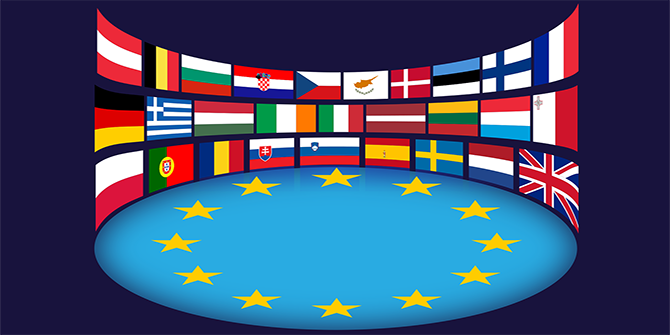 Keir Starmer won the leadership of the Labour Party after its fourth general election loss, and in the midst of the coronarivus pandemic. Richard Rose addresses his prospects, and argues he must first take control of the party.
Keir Starmer won the leadership of the Labour Party after its fourth general election loss, and in the midst of the coronarivus pandemic. Richard Rose addresses his prospects, and argues he must first take control of the party.
Sixty years ago I co-authored a Penguin Special with the title Must Labour Lose? Labour had lost three general elections in a row with its vote falling as low as 43 percent in 1959. In 2020, Keir Starmer is the new leader of a Labour Party that has lost four successive elections.
The 1964 general election result justified the use of a question mark to flag the fact that nothing is certain about an election result four years off. The Tories demonstrated the strength of the adage: the Opposition doesn’t win an election, it’s the government that loses it. The appointment by Tory grandees of the 14th Earl of Home, Sir Alec Douglas-Home, as Prime Minister in 1963 hurt the Conservative vote. After the unexpected death of Hugh Gaitskell, Harold Wilson became the Labour leader who campaigned on the cross-class theme of modernizing Britain after 13 years of Tory government. Even then, Labour only squeaked a majority of five.
The COVID-19 pandemic has abruptly altered the Conservative government’s image. The party has become a champion of the National Health Service. Night after night on television Cabinet ministers are telling people what to do to save lives and the NHS. At the next election Boris Johnson’s story of how much he owes the NHS for saving his life will be much more familiar to voters than Labour’s account of introducing the NHS before the great majority of voters were born.
While the life-threatening epidemic should be over well before the next election, the consequences for public policy will remain and they give Boris Johnson the opportunity to promote the Conservatives as a one-nation party. It is no longer trumpeting the Thatcherite doctrine that there is no such thing as society. Instead, it is emphasizing the importance of public services to maintain the public’s health. Just as the wartime coalition gave prestige and extra rations to coal miners, so the Conservative government is showing respect for health service workers and the expert knowledge of the Chief Medical Officer.
The economic cost of locking down the economy to fight coronavirus will bury the immediate cost of Brexit, because it is much larger. Moreover, there is an immediate impact on people who are furloughed or made jobless and it is visible to shoppers in the closure of local stores. This will carry more weight with voters than econometric analyses that seek to disentangle the respective contributions of Brexit and COVID-19 to recession. The Conservatives no longer present themselves as the Brexit Party but as a national government fighting coronavirus on behalf of everyone.
The dependence of the health service on immigrants from Europe and all over the world offers Johnson an escape from an immigration policy designed to satisfy his anti-immigrant backers. The rules for awarding a work permit to an immigrant will have to be changed from an income of £30,000 a year to one that takes into account the need for low-paid immigrant workers to maintain hospitals and care homes.
The Conservative government has disabled the weapon it has used in the past to undermine costly Labour proposals: how are you going to pay for it? It has pledged to spend whatever billions it takes to protect people and businesses from the immediate effects of lockdown and to re-construct the economy once the recession bottoms out. The winner of the 2024 general election will preside over a government spending a much higher proportion of national income than did Tony Blair or Gordon Brown. However, facing the highest deficit since the Second World War, whichever party wins the next election will have little fiscal scope for additional spending.
Because Boris Johnson owes his big election majority to winning former Labour constituencies in the North of England he has a counterweight to restrain pressure from Tory MPs who are opposed to big government. Ex-Labour voters in Conservative-held seats in County Durham will, to use a Tony Blair phrase, be interested in policies that work. For Johnson and his adviser Dominic Cummings, the policy that works best is that which will win him re-election and given health experts the responsibility for delivering a policy that works to curb the pandemic.
A new Opposition leader cannot influence public policy much besides demanding the government do more to stop the virus spreading. Nor can Keir Starmer use his command of detail to cut through the bluster of Johnson’s case for Brexit when it is off the political agenda. Moreover, when Brexit does regain prominence, Johnson will counter by claiming that taking back control from Brussels is necessary to get coronavirus done.
The one thing that a new Labour leader can do is take control of the Labour Party. Tony Blair and Peter Mandelson overcame resistance to radical changes in Labour’s appeal by arguing that failing to do so would result in the party suffering its fourth successive election defeat. By gaining control of the party’s National Executive Committee from the Corbynites, Keir Starmer is in a good position to get rid of the policies and people that produced Labour’s two most recent election defeats. Labour MPs who have been driven out of the party by bullying and anti-semitism could be invited to rejoin. The power of activists to intimidate and de-select Labour MPs could be curbed. The disarray of the Liberal Democrats offers an opportunity to encourage former Labour voters such as Alastair Campbell to come back to Labour.
The big risk is the impact on party finances, for trade unions such as Unite have used their money to underwrite Jeremy Corbyn’s leadership. But before flexing their financial muscles, they might ask themselves which they think is the more likely consequence of maintaining Corbyn’s legacy: a Labour victory at the 2024 general election or Labour losing again?
____________________
 Richard Rose is Professor of Public Policy at the University of Strathclyde Glasgow. His newest book is How Referendums Challenge European Democracy: Brexit and Beyond.
Richard Rose is Professor of Public Policy at the University of Strathclyde Glasgow. His newest book is How Referendums Challenge European Democracy: Brexit and Beyond.
All articles posted on this blog give the views of the author(s), and not the position of LSE British Politics and Policy, nor of the London School of Economics and Political Science. Featured image: Keir Starmer and Jeremy Corbyin. Image credit: Jeremy Corbyn /(CC BY 2.0) licence








Labour should monitor levels of inequality in Britain which could be increased as the Conservatives start to repay debts incurred by Corvid and Brexit. Corbyn’s policies were good (and the Conservatives have implemented many of them), but his personality made them look totally unachievable and most people distrusted him. We need some reforms in Britain – particularly as regards education, social care, pensions and taxation, but where is the current leadership of the Labour party on these issues ?